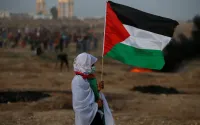Published on Wednesday, November 12, 2003 by the Knight Ridder Newspapers
A new, top-secret CIA report from Iraq warns that growing numbers of Iraqis are concluding that the U.S.-led coalition can be defeated and are supporting the resistance.
The report paints a bleak picture of the political and security situation in Iraq and cautions that the U.S.-led drive to rebuild the country as a democracy could collapse unless corrective actions are taken immediately.
L. Paul Bremer, head of the U.S.-led Coalition Provisional Authority in Iraq, who arrived unexpectedly in Washington for strategy sessions on Tuesday, essentially endorsed the CIA's findings, said a senior administration official.
The report's bleak tone and Bremer's private endorsement differ sharply with the upbeat public assessments that President Bush, his chief aides and Bremer are giving as part of an aggressive publicity campaign aimed at countering rising anxieties at home over increasing U.S. casualties in Iraq.
Two senior administration officials, who spoke on condition of anonymity because the document is classified, described the report's findings in broad terms, but didn't give excerpts or details of any recommendations.
The report landed on the desks of senior U.S. officials on Monday. The speed of the leak suggested that senior policymakers want to make sure the assessment reaches Bush.
Some senior policymakers have complained of being frustrated in their efforts to provide Bush with analyses of the situation in Iraq that are more somber than the optimistic views of Vice President Dick Cheney, Secretary of Defense Donald H. Rumsfeld and other hardliners.
The CIA analysis suggests U.S. policy in Iraq has reached a turning point, as the Bush administration moves to escalate the war against the guerrillas and accelerate the transfer of political power to Iraqis.
Both options are potentially risky.
In Baghdad, the U.S. military announced Tuesday that it will wage a more aggressive offensive against the loose confederation of former Saddam Hussein loyalists, foreign and Iraqi Islamic extremists and Iraqi nationalists.
"The most important message is that we are all going to get pretty tough, and that's what is needed to defeat the enemy, and we are definitely not shy of doing that when it is required," Lt. Gen. Ricardo Sanchez, the top U.S. general in Iraq, told journalists.
Such a campaign, however, could cause more civilian casualties and drive more Iraqis to the side of the insurgents.
At the same time, the CIA assessment warns that none of the postwar Iraqi political institutions and leaders have shown an ability to govern the country or even preside over drafting a constitution or holding an election.
Bill Harlow, a CIA spokesman, declined to confirm or deny the existence of the new report, saying the agency does not discuss such matters.
The growing toll of dead and wounded has cost Bush a significant loss of popularity as he begins campaigning in earnest for re-election next November.
Bremer and top Bush officials, including Secretary of State Colin Powell and Rumsfeld, met at the White House on Tuesday to examine ways to speed up the restoration of Iraqi self-government. Bush did not attend.
U.S. officials have become deeply frustrated by infighting, nepotism and inaction within the 25-member Iraqi Governing Council, the U.S.-appointed body of Iraqi politicians that has been given limited powers to govern Iraq. The council also is in charge of overseeing the drafting of a constitution.
Bremer, Powell, Rumsfeld and other officials also discussed moves to speed up the recruiting of U.S.-backed Iraqi security forces, including a new army.
More than 118,000 Iraqis are serving in the new Iraqi army, police and other forces, and U.S. officials aim to bring the total up to more than 220,000 sometime in 2004.
Accelerating a restoration of Iraqi self-rule, speeding up the recruiting of Iraqi security forces and intensifying a U.S. counter-insurgency campaign form the crux of a new U.S. strategy to crush the resistance, consolidate the support of ordinary Iraqis for U.S.-led democracy-building efforts and reduce the U.S. military presence.
"The long-term security of Iraq will be assured by the Iraqis themselves," Bush asserted in a Veterans Day speech on Tuesday to the Heritage Foundation, a conservative Washington think tank.
The CIA assessment, said the senior administration officials, was composed by the CIA station chief in Baghdad, a veteran operations officer who oversees more than 275 officers in Iraq.
The report is a type known in intelligence parlance as an AARDWOLF, a special field assessment that is usually requested by senior policymakers in Washington at important junctures in overseas crises.
The report, one official said, warned that the more aggressive U.S. counter-insurgency tactics could induce more Iraqis to join the guerrilla campaign that has killed at least 153 U.S. soldiers - 35 of them so far this month - since Bush declared an end to major combat operations in Iraq on May 1.
It also raised concerns about the governing council. The group, which is dominated by former Iraqi exiles with little popular support, has failed to persuade ordinary Iraqis that the occupation is temporary and will lead to a unified, sovereign Iraq, the report said
Bremer has been formulating ways "in which the Governing Council can evolve into a decision-making body to move the constitutional process along," said a third senior U.S. official, who also spoke on condition of anonymity.
He denied recent news reports that the Bush administration is considering replacing the council with some other group of Iraqis.
According to the second senior administration official, the report warned that the inability of the U.S.-led coalition to crush the resistance is convincing growing numbers of Iraqis that the occupation can be defeated, bolstering support for the insurgents.
It also raised the concern that majority Shiite Muslims could begin joining minority Sunnis in turning against the occupation.
Such a development would almost certainly doom the Bush administration's chances of succeeding in Iraq.
The Shiites comprise 60 percent of Iraq's 25 million people. They suffered massive repression under Saddam, whose regime favored the Sunnis. Most Shiite leaders have been willing to give the U.S.-led occupation time to restore Iraqi sovereignty, as that would give them power for the first time since the country was created by Britain under a mandate of the League of Nations in 1920.
But frictions between the U.S.-led occupation and the Shiites have been intensifying, fueled by incidents such as the killing this week by a U.S. soldier of the mayor of Sadr City, a massive Shiite slum in Baghdad.
In another finding, the CIA report said there is no way to completely seal Iraq's borders with Syria, Turkey, Iran, Jordan, Saudi Arabia and Kuwait to infiltration by foreign Islamic extremists bent on killing Americans.
U.S. officials and military commanders blame the foreigners, Iraqi Islamic extremists and Saddam loyalists for the bombings and guerrilla-style ambushes of U.S. forces that have been increasing in frequency and sophistication.
Most attacks have been concentrated in Baghdad and a 200-square-mile Sunni-dominated region north of the capital that includes Saddam's hometown of Tikrit.
In an effort to discourage support for the United States, the insurgents also have targeted peacekeepers from other countries, international organizations like the United Nations, and Iraqis who have cooperated with the U.S.-led occupation.
Bush on Tuesday reiterated his resolve to stay the course and crush the insurgency, and his belief that the United States will prevail in helping to build "democracy and peace and justice" in Iraq that will be a model for the Middle East.
Knight Ridder correspondents Warren P. Strobel and Maureen Fan contributed to this report.






